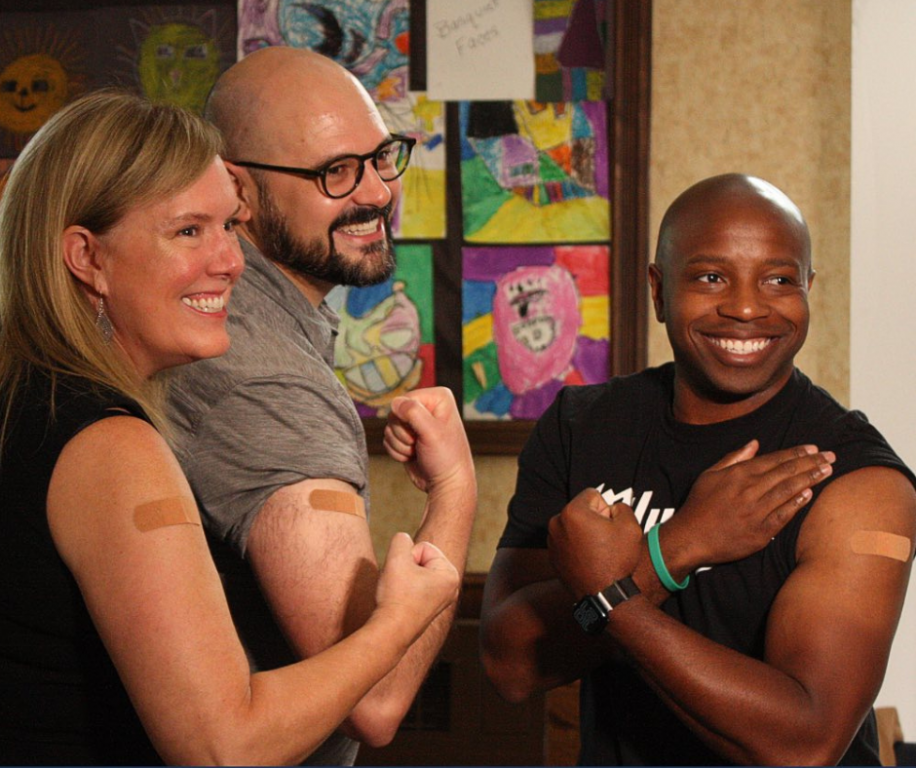Kirsten Johnson Aims to Restore Trust in Public Health
And bolster workforce. State DHS leader oversees nearly 6,000 employees.

Wisconsin Department of Health Services Secretary-designee Kirsten Johnson, left, joins a City of Milwaukee Health Department flu shot kick-off event Oct. 5, 2023. Pictured with Secretary Johnson are Milwaukee Commissioner of Health Mike Totoraitis, center, and Mayor Cavalier Johnson. (Photo courtesy of the Milwaukee Health Department)
As Kirsten Johnson starts her second year as the head of Wisconsin’s state health department, she has a bulging portfolio of responsibilities.
The Department of Health Services (DHS) is the second-largest executive branch agency, with nearly 6,000 employees. (Only the the Department of Corrections, which runs the state prison system, is larger, employing more than 8,000 people.)
In Johnson’s first year on the job, she spent time getting to know that department’s work in depth. She also focused on mental health and resources to address that subject, which Gov. Tony Evers had made a priority when he declared 2023 “the year of mental health.”
The COVID-19 pandemic helped spotlight the importance of mental health — in the general public, but also for people working in health care.
“The experiences we had on the ground, responding to the pandemic and treating people — ultimately we experienced some trauma and crisis collectively,” Johnson said in an interview last week with the Wisconsin Examiner.
This year the state of the health care workforce is at the top of Johnson’s task list. Evers in his State of the State address in January declared 2024 “the year of the worker” in Wisconsin, and two weeks ago he announced the creation of a health care workforce task force.
Johnson will serve with Amy Pechacek, secretary-designee of the Department of Workforce Development (DWD), as vice co-chairs of the task force. The body is headed by Lt. Gov. Sara Rodriguez, a registered nurse who went from working in hospital emergency rooms to a series of public health and health policy positions before she was elected to the state Legislature.
Bringing together expertise
Evers named the 25 task force members on Tuesday, Feb. 6. The group includes representatives from health care trade and professional associations, executives of major health systems around the state and university and technical college officials in health profession disciplines.
“I really hope that we are able to galvanize a lot of the experts who are on the task force and have a collective voice around advocating for the health care workforce,” Johnson said.
The health care workforce includes people working in public health, said Johnson. She hopes the task force will be able to tap the ideas of health care workers every day “to alleviate the burden that health care workers are experiencing [and] that health care organizations are experiencing to build additional trust and credibility, which may have been lost through the pandemic.”
DHS has latitude to take certain actions, such as a standing order the department issued Jan. 25 ensuring BadgerCare patients have direct access to over-the-counter emergency contraception. “That’s something that we can do administratively that increases access to reproductive health care for women in Wisconsin [and] that potentially alleviates the burden on providers of having to write a prescription,” Johnson said.
In a similar vein, DHS will look at whether there are steps it can take directly that can respond to bolster the health care workforce.
“Are there different types of providers that we can recognize? Is there a certification process that can be put in place?” Johnson asked, speaking hypothetically. “I’m really curious to learn from our local partners and providers who are part of the task force. I hope that we get a good mix of things that we can potentially do internally with our authorization.”
Background in local public health
Johnson came into the position as DHS secretary after heading the city of Milwaukee’s health department since 2021, and for 10 years before that serving as the health commissioner for the two-county Washington-Ozaukee Public Health Department north of Milwaukee.
Her experience in local public health has helped inform her work at the state health department, Johnson said. In her previous roles she looked to DHS and its public health division for direction while addressing local public health needs. Now, she said, “I’ve put an emphasis on, how do we be the best partner we can be, how can we be transparent? And how do we serve Wisconsinites best?”
The COVID-19 pandemic was a pivotal experience for the state health department, local health agencies and Johnson herself. When she went to Milwaukee she expressed concern that she lacked political support from local government officials in responding to the pandemic in her previous position, according to published reports at the time.
In September 2021, as some in the Milwaukee Common Council pressed the city to renew a citywide mask requirement in the face of a resurgence in the virus, Johnson advised against issuing a mandate.
“I’ve really thought a lot about masks and mask mandates,” Johnson told the Wisconsin Examiner. The mask requirements issued in 2020 during the first few months of the pandemic were followed by “a really highly politically charged response” she said. That became “damaging to the conversation around when masks can be used most successfully … when they’re useful and when they’re not.”
Her work as a local health commissioner gave her “a direct line of sight on how transmission was happening,” Johnson said: typically in close gatherings of friends, colleagues or family members where people probably ignored the mask requirement.
A more nuanced message about masking, she said, might have encouraged people to think carefully about their risks and to advise them to wear masks specifically in close indoor gatherings if they were at higher risk for serious illness from the novel coronavirus. On the other hand, she observed, it became clear eventually that masks were not needed outdoors.
“Masks are a critical tool to protect yourself and to protect others when you are infected,” Johnson said. “But it’s not something that I think should be mandated, because it really depends on the circumstances.”

Wisconsin Department of Health Services (DHS) Secretary-designee Kirsten Johnson, right, and State Health Officer Paula Tran, center, speak with Dr. Mandy K. Cohen, left, director of the Centers for Disease Control and Prevention (CDC), when Cohen visited the DHS offices in Madison on Aug. 16, 2023. (Photo courtesy of DHS)
COVID-19 enters a new phase
Wisconsin has passed through another COVID-19 spike over the fall and early winter. Individual cases are no longer tracked because many people who get infected confirm their illness with a test done at home that is likely not reported to local public health authorities.
Instead the spread of the novel coronavirus responsible for the illness is measured primarily by the numbers of people in the hospital and by the detection of the virus in wastewater across the state. The latest DHS data show a dramatic drop in viral presence in wastewater and falling hospitalizations in most regions of the state.
As with influenza, there will likely be annual COVID-19 vaccines that people get to prevent severe illness and hospitalization, Johnson said, although it’s still too soon to be certain about its seasonal pattern.
Over the last two years, not much has changed in managing the spread of the illness. “We have the same tools that we’ve had available to us — vaccine, staying home when symptomatic, using a mask appropriately,” Johnson said. But while public health providers have learned “a tremendous amount” about the virus, there’s also still much more to learn.
The heightened reluctance by many people to get vaccinated remains a concern. “Political polarization, around COVID itself” has helped escalate opposition, she said, both to the COVID-19 vaccine but also to older, well-established vaccines. But it’s not the first time.
“Vaccine hesitancy and the debate around whether or not vaccines are effective and whether the side effects outweigh the benefits of vaccines have existed since the beginning of vaccines,” Johnson said.
The current cycle of mistrust “was largely driven by the pandemic,” Johnson said. “It was scary — people just didn’t know. There was a lot of trauma associated with the pandemic, mentally … I think all of that played into people who were fearful.”
But that can change, she added.
“I think it’s just going to take us time to rebuild trust and credibility around vaccines,” Johnson said. While the decline in vaccination rates crosses a variety of demographic groups, “I am confident that we will get more people vaccinated over time.”
Lifting up public health
The COVID-19 pandemic was a time of trial for public health as an institution and as a professional discipline.
“In many ways, the pandemic was incredibly challenging for the people who work in public health, who’ve dedicated their careers to helping people and never imagined they’d find themselves on the front end of a pandemic — let alone sort of the flashpoint of a really politically divisive issue, when at the end of the day, we’re just trying to save lives,” Johnson said.
“So there has been some level of more moral injury to the individuals working in public health,” she added — driving many leaders in the field to retire early or change professions “because we’re all just really tired, and it was really hard.”
In the depths of that trial, there were experiences that gave her hope.
“I think that it brought us together in a way that had never happened before,” Johnson said. “And for those of us who went through it, it built relationships and partnerships and communities that didn’t exist previously — really genuine relationships with school districts and city councils and county executives.”
Those weren’t always easy relationships, she added. “But at the same time, I think in the long run it will benefit public health as a profession, because it’s about those relationships that were formed.”
The public health infrastructure, nationally and in Wisconsin, “certainly has been damaged” during the pandemic Johnson said. Nevertheless, “I think that we will come out of it in the long run, I hope, with a stronger system.”
She saw the faces of that hope in the people she worked with at the Milwaukee Health Department.
“The team that is there is just incredibly dedicated and bright,” Johnson said. And she has optimism for the profession as well. “There are lots of young people who are interested in public health — [enrolled] in masters of public health programs and public health majors,” Johnson said.
“It’s an amazing profession, in that what you do matters every day. And I think that resonates. It resonates for me — my work has always been incredibly purposeful and personal. And I think that the folks coming into public health, I have so much respect for. They’re just great humans doing really good work and working really hard.”
Johnson aims to bolster the state’s health workforce, restore trust in public health was originally published by Wisconsin Examiner.





















